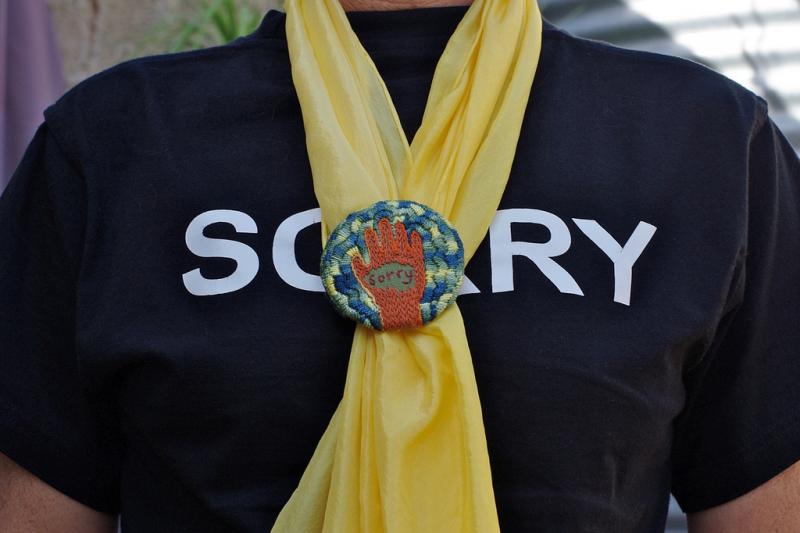Apology as Cure: Finding the Secret Ingredients to Make "Sorry" Really Work

 Here are three more questions reporters should pursue based on the debate over the SorryWorks! program. Last week I talked about some of the common ground in the debate and suggested that even the fundamental assumption about the number of patients harmed by medical error every year deserves scrutiny.
Here are three more questions reporters should pursue based on the debate over the SorryWorks! program. Last week I talked about some of the common ground in the debate and suggested that even the fundamental assumption about the number of patients harmed by medical error every year deserves scrutiny.
1. Are medical errors being kept secret through confidentiality agreements? In addition to advocating for state and federal reforms that would encourage physicians to apologize for errors while discouraging lengthy malpractice lawsuits, SorryWorks! founder Doug Wojcieszak argues that too many medical malpractice settlements are kept confidential through gag orders or sealed files in court. He writes that "keeping these cases ‘open' and learning from them should be the preferred route in the expanding world of disclosure."
I would argue even further that all cases be kept open, regardless of whether they are settled, result in a jury verdict or end up being dropped. Sometimes plaintiffs are so beaten down by the court system that they give up, and yet a pattern of similar cases could provide evidence for a story about medical negligence. In some courts, when a defendant wins, the case file is shredded. All of that evidence is lost.
Ask your district court for a spreadsheet with all lawsuit filings coded by type over the past 10 years. Look for malpractice and wrongful death cases. (Some of the wrongful death cases will not be medical, but you can weed those out later.) Then see if the lawsuits have been sealed at any point during the case. Identify patterns. Which hospitals, doctors, medical groups, and insurers tend to have open cases and which are always closed? If one or two hospitals have created a cone of silence, there's your story.
2. Are medical malpractice lawsuits crippling medicine?
The patient advocates who have started a counter campaign to SorryWorks! say there were only 9,762 malpractice payments made for physicians in 2011 compared to the 100,000 to 200,000 deaths. There is also a larger question of whether good doctors are actually being prevented from doing their jobs because of malpractice litigation. Why not investigate the number of doctors sued every year in your area compared to the number who are licensed to practice? A study in the New England Journal of Medicine in 2011 made headlines saying that most doctors in high-risk specialties are sued but that, even of those, most don't end up paying a claim.
Why not find out who is actually paying the claims and whether insurance companies and regulators are doing anything to put them out of business? What you will find, I bet, is that a relative handful of doctors are responsible for most of the payments.
3. Can Sorry Works! work? In 2005, when Sorry Works! was just getting started, Wojcieszak said the program already was showing "amazing results."
The University of Michigan hospital system reports they have cut their lawsuits in half – back to pre-1990 levels – and have reduced litigation expenses by two thirds. They say they have "excited actuaries." Many other hospitals and insurance companies including Kaiser hospitals, Catholic Healthcare West hospitals, Children's Hospital of Minnesota, VA hospitals, and Copic Insurance are reporting equally positive results.
Now older and presumably wiser, Sorry Works! should have more examples and concrete data to back up its success claims. Take a hard look at five years of experience with the program and see whether lawsuits have gone down, malpractice payments have gone down, and, most importantly, if patient outcomes have improved. For example, do hospitals with Sorry Works! programs have lower readmission rates than hospital without them? Also, look at other measures that health care organizations have taken in that time to reduce errors and encourage better adherence to medical protocols.
What are your ideas for how reporters should cover medical errors and the ways health care providers respond to them? Leave a comment below. Write to askantidote@gmail.com. Or send me a note on Twitter @wheisel.
Related Posts:
Apology as Cure: Dig into Data to Find Number of Patients Harmed
Apology as Cure: Should Laws Change to Encourage Doctor to Admit Medical Errors?
Q&A with Mary Flowers: Looking for New Ways to Improve Patient Safety
Hospitals must change surgical scrub culture from within
Serious Complications: Should Andy Rooney's Cause of Death Be Kept Secret?
Q&A with Alan Bavley: Finding Gold in the National Practitioner Data Bank
Q&A with Journalist Alan Bavley: Keeping Track of Medical Malpractice Frequent Fliers
Photo credit: butupa via Flickr

